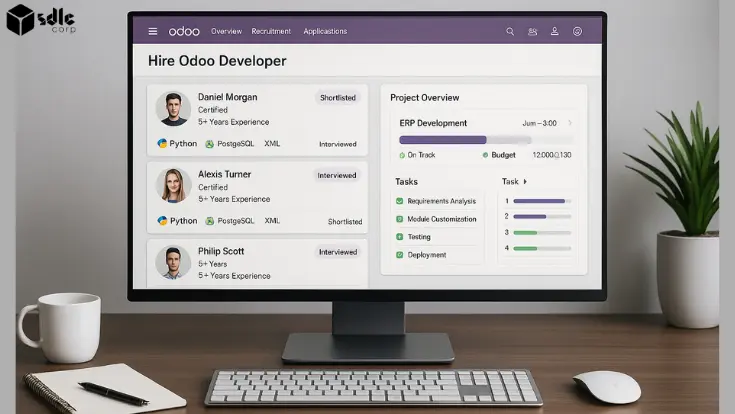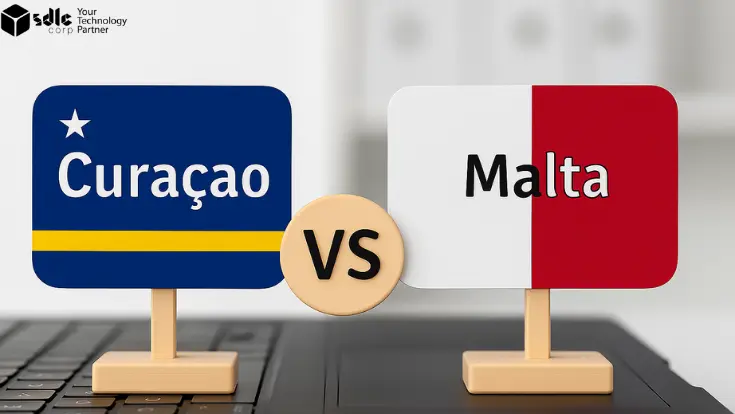The rise of digital assets has ushered in a new era of ownership—defined by blockchain technology, decentralization, and Non-Fungible Tokens (NFTs). Platforms like OpenSea have been at the forefront of this revolution, creating decentralized environments where users can buy, sell, and mint digital art, music, collectibles, and virtual assets. As the NFT industry experiences explosive growth, developers and entrepreneurs are increasingly drawn to the opportunity of building their own NFT marketplaces. This guide presents a comprehensive roadmap to developing a robust, scalable, and user-friendly platform similar to OpenSea, covering every stage from initial concept and blockchain integration to smart contract development and a successful launch with SDLC Corp as your strategic development partner.
Understanding the NFT Marketplace Ecosystem

An NFT marketplace isn’t just an eCommerce site for digital files. It’s a complex blockchain-based system with components such as:
- Smart Contracts for transactions and royalties
- Token Standards like ERC-721 and ERC-1155
- Digital Wallet Integration (e.g., MetaMask, WalletConnect)
- Decentralized Storage (e.g., IPFS)
- Minting Mechanisms to tokenize digital content
Understanding these core pillars is essential before moving into the development stage.
Core Features of an NFT Marketplace Like OpenSea

To compete with established players, your platform should offer:
1. User Authentication
Wallet-based login using MetaMask, Coinbase Wallet, WalletConnect, etc.
2. NFT Minting
Enable users to create NFTs directly through the platform using token standards like ERC-721 or ERC-1155.
3. Smart Contract Integration
Automate and secure transactions, enforce royalties, and ensure ownership transfers.
4. Listing & Bidding System
Support for both fixed-price sales and timed auctions.
5. Search and Filtering Tools
Enable users to discover content via category, artist, price range, tags, or popularity.
6. Transaction History
Transparent logs of past sales, bids, and wallet activity.
7. Admin Dashboard
Backend controls for managing users, content, disputes, and analytics.
Blockchain Options: Choosing the Right Network

Your blockchain choice impacts speed, cost, and scalability:
| Blockchain | Strengths | Weaknesses |
|---|---|---|
| Ethereum | Popularity, security, ecosystem | High gas fees |
| Polygon | Ethereum-compatible, low fees | Still reliant on Ethereum's infra |
| Solana | High throughput, low transaction costs | Less mature ecosystem |
| Binance Smart Chain (BSC) | Fast, cost-effective | More centralized than others |
Your selection should align with your target audience, feature set, and performance goals.
Recommended Technology Stack

A scalable tech stack ensures seamless performance:
- Frontend: React.js, Vue.js, or Angular
- Backend: Node.js or Python (Flask, Django)
- Blockchain: Ethereum, Polygon, Solana
- Smart Contracts: Solidity (Ethereum-compatible)
- Database: MongoDB, PostgreSQL
- File Storage: IPFS or Pinata
- Wallets: MetaMask, WalletConnect
Smart Contracts: Automating NFT Logic

Smart contracts are the backbone of decentralized apps. In NFT platforms, they handle:
- NFT minting and metadata storage
- Ownership transfer upon sale
- Creator royalties for secondary sales
- Auction logic (minimum bid, time limits)
Solidity is the go-to language for Ethereum-based smart contracts. Rigorous testing and auditing are crucial to avoid vulnerabilities.
UI/UX Design for NFTs

The user experience must combine simplicity with blockchain functionality:
- Themes: Light/Dark modes
- NFT Galleries: Grid or carousel views
- Previews: Video, 3D, or interactive content
- Wallet Connection: Seamless login and transaction flows
- Responsive Design: Mobile-first optimization
Good design reduces the learning curve for users new to NFTs and improves retention.
Security and Compliance

As NFT platforms involve high-value transactions, security and legal adherence are non-negotiable.
Security Best Practices:
- Two-factor authentication (2FA)
- SSL encryption
- Regular penetration testing
- Smart contract audits (via CertiK, OpenZeppelin, etc.)
Legal Compliance:
- KYC/AML verification for users
- Data privacy policies (GDPR, CCPA)
- Terms of service and IP ownership policies
Monetization Strategies

An NFT platform needs sustainable revenue. Monetization models include:
- Transaction Fees: Take a percentage of each sale
- Listing Fees: Charge for minting or publishing NFTs
- Subscription Tiers: Offer exclusive features or reduced fees
- Promotional Tools: Sponsored listings or homepage placements
Step-by-Step Development Roadmap

Here’s a streamlined development plan:
- Market Research: Identify gaps and analyze competitors
- Define Niche: Art, music, gaming, virtual land, etc.
- Select Blockchain: Choose based on scalability and fees
- Write Smart Contracts: Minting, ownership, royalties
- Design UI/UX: Use Figma or Adobe XD for wireframes
- Develop Backend & Frontend: Integrate APIs and blockchain
- QA Testing: Security audits and bug checks
- Deploy to Mainnet: Use tools like Hardhat or Truffle
- Launch & Maintain: Ongoing updates, community building
Challenges You May Face

Be prepared for hurdles such as:
- High Gas Fees: Optimize contracts and consider Layer 2 solutions
- Smart Contract Bugs: Audit thoroughly before launch
- Scalability: Cloud-based infrastructure (AWS, GCP) and caching
- Regulatory Ambiguity: Work with legal advisors
- User Education: Tutorials, tooltips, and onboarding flows
White-Label NFT Marketplaces

For startups with limited resources, white-label platforms offer:
- Faster time-to-market
- Prebuilt infrastructure (wallets, dashboards, contracts)
- Customizable design and branding
- Lower development costs
Providers like Rarible Protocol, Mintbase, or NFTify can be explored for ready-made solutions.
Lessons from OpenSea’s Success

OpenSea succeeded through:
- Multi-chain support (Ethereum, Polygon, Solana)
- ERC-721 and ERC-1155 compatibility
- Streamlined wallet integration
- Active community engagement
- Clean and responsive design
Don’t copy OpenSea. Instead, analyze, adapt, and differentiate. Consider unique selling points like reduced fees, better royalties, niche focus (e.g., music or sports), or AI-driven discovery.
Emerging Trends in NFT Marketplaces

To future-proof your platform, track these trends:
- Fractional NFTs: Shared ownership of high-value items
- Cross-chain Compatibility: Transfer NFTs across blockchains
- Green NFTs: Eco-friendly blockchains like Flow or Tezos
- AI-Powered Curation: Personalized recommendations
- Metaverse Integration: In-game NFTs, avatars, virtual land
Conclusion
Building an NFT marketplace like OpenSea is not just ambitious—it’s entirely achievable with the right blend of tools, technology, and vision. Whether you’re crafting your platform from the ground up or opting for a robust white-label NFT marketplace solution, the key to success lies in seamless tech integration, intuitive user experiences, and a commitment to continuous innovation. NFTs aren’t just a fleeting trend; they represent a transformative leap in digital ownership and the future of decentralized economies. Now is the perfect time to launch your own NFT marketplace and lead the change. For expert guidance and end-to-end development support, contact us at SDLC Corp—we’re here to help you shape the next frontier in Web3.
FAQ's
1. What is an NFT Marketplace and How Does It Work?
An NFT marketplace is a decentralized platform where users can mint, list, buy, and sell NFTs securely using blockchain technology. It uses smart contracts to automate ownership transfers, enforce royalties, and verify authenticity.
2. Which Blockchain is Best for Launching an NFT Marketplace?
It depends on your needs:
- Ethereum: Most established, but has high gas fees.
- Polygon: Low-cost Ethereum Layer 2 solution.
- Solana: High speed and low fees.
- Binance Smart Chain: Affordable and fast but less decentralized.
3. What Are the Must-have Features for an Opensea-like Platform?
- Wallet login (MetaMask, WalletConnect)
- NFT minting (ERC-721/ERC-1155)
- Listing (fixed-price & auction)
- Smart contract integration
- User profiles & admin dashboard
- Search, filters, and transaction history
4. What Tech Stack Should I Use?
- Frontend: React.js or Vue.js
- Backend: Node.js or Python
- Blockchain: Ethereum, Polygon, Solana
- Smart Contracts: Solidity
- Storage: IPFS or Pinata
- Database: MongoDB or PostgreSQL
5. How Can I Monetize My NFT Marketplace?
- Take a percentage of each sale
- Charge for minting or listing
- Offer premium subscriptions
- Enable sponsored/featured NFTs
6. What Are the Key Security and Compliance Requirements?
- Smart contract audits (e.g., via OpenZeppelin)
- 2FA, SSL, and secure wallet integrations
- KYC/AML for regulatory compliance
- Privacy policies (GDPR/CCPA)

















